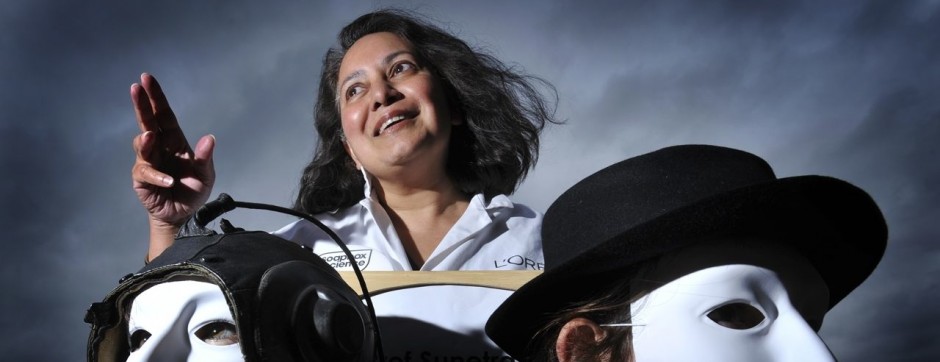 Professor Claudia Eberlein studied Physics at the University of Leipzig and gained her Diploma there in 1990. She then moved to the University of Sussex where she completed her PhD in 1993. After two years of postdoctoral work at the University of Illinois at Urbana-Champaign and two years as Research Fellow at Newnham College Cambridge, she obtained a Royal Society University Research Fellowship which she took to the University of Sussex. She is now Professor of Theoretical Physics and currently also the Head of the Department of Physics & Astronomy. Soapbox Science Brighton is grateful to SEPnet for providing sponsorship for Professor Eberlein and the 2017 event.
Professor Claudia Eberlein studied Physics at the University of Leipzig and gained her Diploma there in 1990. She then moved to the University of Sussex where she completed her PhD in 1993. After two years of postdoctoral work at the University of Illinois at Urbana-Champaign and two years as Research Fellow at Newnham College Cambridge, she obtained a Royal Society University Research Fellowship which she took to the University of Sussex. She is now Professor of Theoretical Physics and currently also the Head of the Department of Physics & Astronomy. Soapbox Science Brighton is grateful to SEPnet for providing sponsorship for Professor Eberlein and the 2017 event.
SS: Claudia, what is the most fascinating aspect of your research/work?
CE: My research deals with quantum physics. It is amazing how much of it is relevant to everyday life and applications all around us. I am fascinated by the insight into how things work at the microscopic scale and what that might mean for modern nanotechnology and what we can do with it.
SS: What, or who, inspired you to get a career in science?
CE: I have inherited my dad’s aptitude for maths, and I am grateful to him and all my teachers in school for not discouraging me. I have just always loved maths and hence decided on becoming a theoretical physicist.
SS: How did you get to your current position?
CE: I was awarded a Royal Society University Research Fellowship in 1997 at the University of Cambridge and decided to transfer the Fellowship to Sussex in order to work with Professor Ed Hinds and his experimental physics group. In 2005 I then became a regular member of faculty and subsequently was promoted in several stages, finally to Professor in 2014.
SS: Research in STEMM is becoming increasingly multi-disciplinary. Which STEMM (science, tech, engineering, maths, medicine) subjects do you use in your work? In particular, how does maths play a role in your research?
CE: Maths is my main tool, but I also use computer programming to some extent, and my research has applications in other disciplines, most importantly nanotechnology and biology.
SS: What attracted you to Soapbox Science in the first place – and why Brighton?
CE: I love teaching and I love explaining science to others. I love demolishing people’s prejudices about science being too hard to understand or being irrelevant to them. I think everyone can understand science and it is great to understand how the world around us really works.
SS: Sum up your expectations for the day
CE: I am very much looking forward to the day. My daughter who is 10 will come along too and help explain some cool maths to younger passers-by. We are going to have a fun girl’s day out.
SS: If you could change one thing about the scientific culture right now, what would it be?
CE: Scientific culture isn’t the problem. So much of everyday culture is awfully gender-biased and from a very young age, girls get automatically pressured into supporting roles. In this way girls often get turned off science before they even had a chance to learn much about it. So, if I had a magic wand to change just one thing then I would re-design all toy shops to remove all gender bias.
SS: What would be your top recommendation to a female PhD student considering pursuing a career in academia?
CE: Just do it and follow your dreams and what you are interested in. Don’t get distracted by other people’s opinions.
SS: What words of encouragement would you give to children who might be interested in a career in science?
CE: Science is great fun and everyone can do it. Keep asking questions about why things around you are the way they are.
